SUMMARY
This is AI generated summarization, which may have errors. For context, always refer to the full article.
![[New School] The Filipino-American dilemma: Nasaan ang mga wikang Pilipino?](https://www.rappler.com/tachyon/2022/06/interest-in-writing-june-2-2022-1.jpg)
Besides with my Filipino mother and my brother, I never really use Bisaya or Tagalog outside of my home in Orange County, California. Compared to the more predominant Asian group in the region, Vietnamese Americans, who number 6.1% of the total county population, Filipino Americans only comprise 2.4%. As a 10-year-old immigrant from Bohol, I had already recognized that an encounter with a fellow Filipino peer would be like finding a needle in a haystack.
When I made my first Filipino-American friend, I rejoiced. I was excited to speak my native Filipino languages until he mentioned to me that he was not able to speak any — nor understand. He, moreover, told me none of his siblings and cousins could communicate in Filipino.
Perhaps the sample size was too small?
As the decade since my departure from Bohol went by, I made many more Filipino-American friends. Despite this larger sample size, though, a strong majority of them were English-only speakers. Aside from the occasional compliment that my mother is a p*ta, they were as mutually fluent with Filipino languages as my non-Filipino friends.
Unsurprisingly, I possessed a slightly negative perception towards virtually all my Filipino-American peers for what I perceived as a failure on their part. How could you place the Philippine flag in your Instagram bio while declaring your love for our culture in English, the language of our colonizers — sa wika ng mga banyaga? I retained a superiority complex over my Filipino-less Filipino-American friends throughout my adolescence.
I noticed that this inability to speak one’s heritage language was a uniquely Filipino-American experience. Nowhere else did such a trend sustain itself within the larger American immigrant sphere.
In my own household did I observe this phenomenon play out. My younger sister, who trails me by almost 12 years, has limited proficiency in Bisaya — she is essentially deaf to and mute in conversations in Tagalog. She can’t speak Bisaya, but she can somewhat understand. And as much as I wanted to help develop her fluency in Bisaya, my Filipino mother refused. As adolescents, my brother and I grew up in a household where we were, in effect, forbidden from speaking our native language around and to our baby sister. “ENGLISH ONLY,” as the often-familiar signs in Filipino schools would say.
This, therefore, is in the hands of Filipino-American parents. As a culture, we elevate Americans and American culture into the epitome of our own societal hierarchy. We, for instance, prefer to master the English language over the national language, Tagalog, for we view the former as levels more prestigious and more educated than the latter. This bias is amplified in immigrant Filipinos moving to the United States, who largely ignore Tagalog and other Filipino languages in their fostering of an American-born Filipino.
While I personally prefer them to encourage their children to speak and understand Filipino languages, I can empathize with their not doing so. For a people that has been conditioned to appease to the legacy of American colonization, it is no question why they decide to omit Filipino language-learning in favor of an English-only household. To succeed in an intensely competitive American environment, Filipino languages don’t play a role — at least in their own prophecy of what success looks like for their children. They, consequently, nail and drill English into their children, no matter how broken, grammatically-incorrect, and inconvenient it may be in comparison to if they did so in their own native Filipino language.
And as I became more immersed with my Vietnamese side, I realized the harsh reality that my Filipino-American peers were being confronted with.
Being half-Filipino and half-Vietnamese, I had an obligation to also champion Vietnamese culture. Although home will always be a circular island in the center of the Philippines, I am still also Vietnamese. As I engaged more productively with the Vietnamese community in my area, there was one detail about me that prohibited me from fitting into the Vietnamese puzzle: my inability to speak and understand the Vietnamese language. Both explicitly and implicitly, I felt like a reject in my own community — in what I considered a safe space amid a White America. No matter how much I showcased my admiration, appreciation, and awe for Vietnamese culture, I carry around an asterisk that raises eyebrows from others.
When Filipinos and Filipino Americans who are able to converse in Filipino languages create a barricade between themselves and “White-washed” Filipino Americans, we perpetuate a growing reluctance within the larger Filipino-American youth to connect with their Filipino heritage that continues through the generations. It is not to say that more assimilated Filipino Americans don’t have their own superiority complex; the holistic image of this entire situation is immensely nuanced, and I am for solidarity over fragmentation. Instead of advocating for a more pure Filipino within the Filipino-American community, we should simply advocate for a Filipino — for a descendant of Filipino immigrants to keep the Filipino anchor down despite the waves of American assimilation rattling the ship. Whether they do so in Tagalog, Bisaya, Ilocano, or any other Filipino language is contingent on their own experiences, within and outside of their control.
I wholeheartedly agree that Filipino-American parents have a responsibility to preach Filipino languages in their homes, but we must comprehend their fears and reservations for choosing not to. Only when we are able to accept such are we able to decimate them and construct a culture where being fluent in Filipino languages does not connote an obstacle to the Filipino American’s journey, but instead a trampoline towards even greater success.
So, nasaan ang mga wikang Pilipino sa Estados Unidos? Narito sila at hindi malilimutan — basta tuloy ang pagdiriwang, pag-unlad, at pagmamahal sa kulturang Pilipino at sa kapwa Pilipino. – Rappler.com
Aspiring to become an impactful attorney for the environment, for the immigrant, and for the impoverished, Jan Niño Teodoro Nguyen is a student at Vanderbilt University (Nashville, Tennessee, USA) pursuing a bachelor’s degree in Economics and History, as well as in Cognitive Studies. His wildest dreams consist of becoming a justice of the United States Supreme Court — or perhaps learning how to surf!
Add a comment
How does this make you feel?
![[OPINION] The guilt of being born and raised Filipino, but having English as your first language](https://www.rappler.com/tachyon/2020/08/english-first-language-august-18-2020.jpg?fit=449%2C449)
![[OPINION] Ignorant Manilenyo](https://www.rappler.com/tachyon/2022/03/ignorant-manilenyo-march-2-2022.jpg?fit=449%2C449)
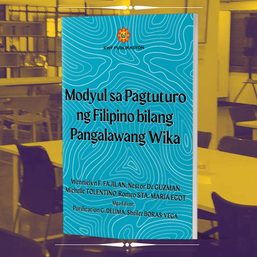
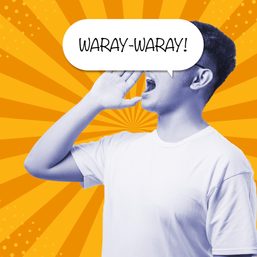
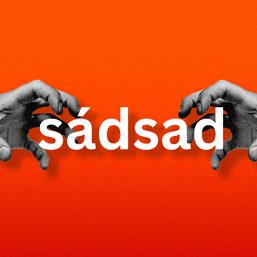
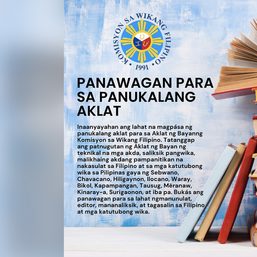
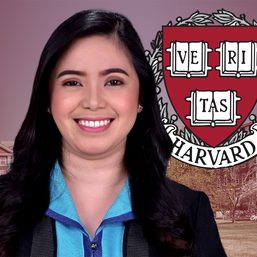
There are no comments yet. Add your comment to start the conversation.